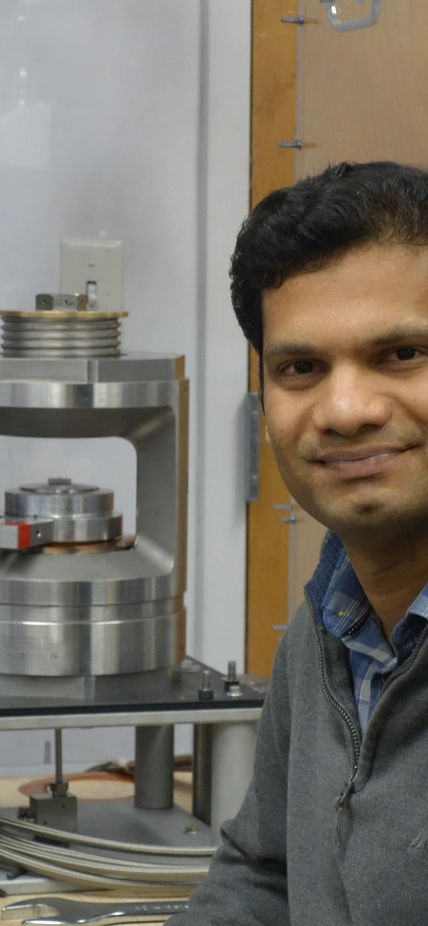Washington, D.C.--Venkata Srinu Bhadram in Timothy Strobel’s lab at the Geophysical Laboratory (GL) will receive the ninth Postdoctoral Innovation and Excellence Award (PIE). These awards are made through nominations from the departments and are chosen by the Office of the President. The recipients are awarded a cash prize for their exceptionally creative approaches to science, strong mentoring, and contributing to the sense of campus community.
According to Strobel Venkata “is one of the best young scientists in high‐pressure research and is poised to become a world leader in the field.” Venkata started his postdoc in the Energy Frontier Research Center (EFree). EFree uses extreme pressure and temperature conditions to advance energy science.
Venkat will have over six important papers by the time his postdoc is finished. He was the first to discover titanium pernitride (TiN2,) and cubic titanic nitride, (Ti3N4) both long‐sought‐after materials with great promise for future technological applications.
Venkat was also the first to discover a rocksalt‐type modification of ZnSiP2, which is one of the most promising materials for multijunction solar cell applications—multiple semiconducting materials allow a broader range of wavelengths to be absorbed. Additionally, Venkata performed the first photocatalytic water splitting measurements on novel zinc‐manganese oxide solid solutions in the rocksalt structure. This process breaks water into its constituent parts of hydrogen and oxygen using light and is important for producing hydrogen—a clean burning fuel. He is also the first to make photocatalytic measurements on high‐pressure materials. Venkata also discovered exotic magnetic ordering in these ZnMnO compounds. Unraveling the physics of how individual atoms interact with each other at the minute level can lead to discoveries of novel phenomena and a better understanding of the synthesis of many new materials. These contributions have been an integral part to the success of EFree.
Venkata is always willing and eager to learn new experimental and theoretical methods, He approaches problems with remarkable innovation. A stellar team player, his work on water‐splitting oxides generated new collaborations between GL and other groups. He was able to bring together different areas of expertise and establish collaborations to develop innovative solutions driving the research forward. Another example is his eagerness to perform inelastic neutron scattering (INS) experiments. Venkat had no experience with these methods, but enthusiastically traveled to Oak Ridge to learn how.
Venkata has been one of the key developers of the 250-ton Paris-Edinburgh Press in GL. It is used for recovering cubic millimeters of samples from high-pressure and high-temperature synthesis experiments. The team has developed their own custom assemblies and anvil designs. Due to Venkata’s contributions, they now perform routine runs up to 80,000 times atmospheric pressure (8 GPa) and 1500 K and over 250, 000 atmospheres (GPa) at room temperature.
Venkata has given several teaching lectures. Most recently he provided an introductory lecture on solid-state physics. The lecture was excellent and accessible to all members of the diverse research group. Venkata regularly volunteers to work with visiting students including high school, undergraduate, graduate, and postdoctoral levels. In all cases, he was a dedicated mentor and spent time to teach complex experimental methods and the underlying physical principles.
Venkata was a visiting investigator at Purdue University, after receiving his Ph.D. from JNCASR, Bangalore, India. He has a master’s in physics from the Indian Institute of Technology in Roorkee, India, and a bachelor’s in mathematics, physics and chemistry from Andhra University, in Visakhapatnam, India.
